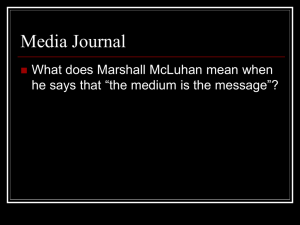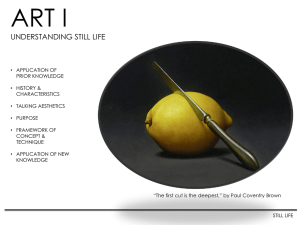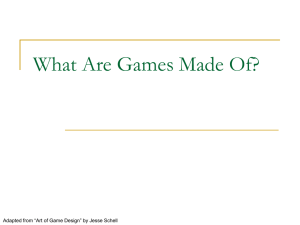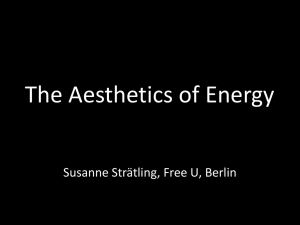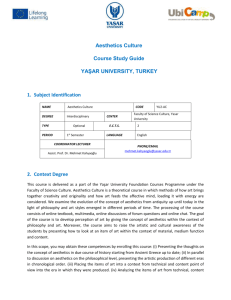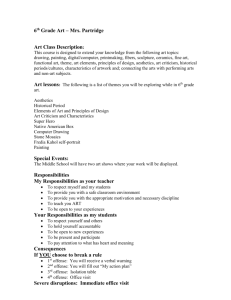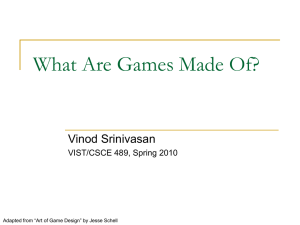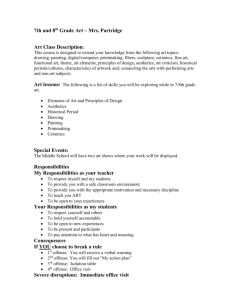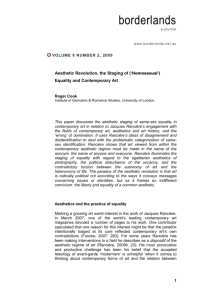Aesthetics & Politics Course Syllabus - University of Alberta
advertisement
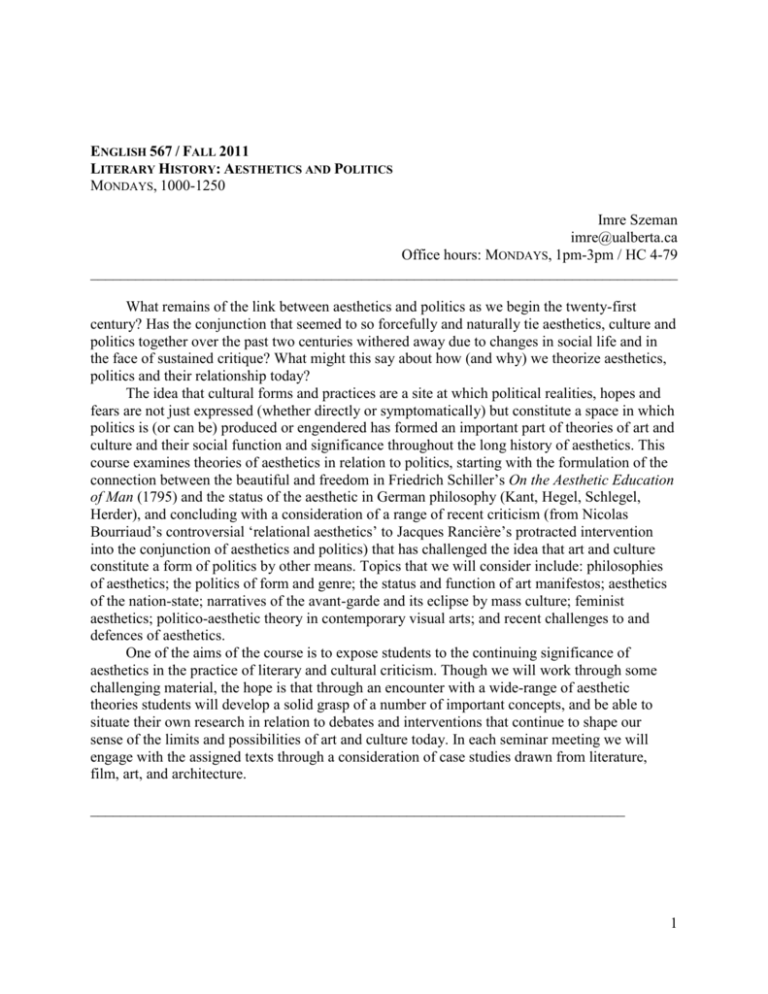
ENGLISH 567 / FALL 2011 LITERARY HISTORY: AESTHETICS AND POLITICS MONDAYS, 1000-1250 Imre Szeman imre@ualberta.ca Office hours: MONDAYS, 1pm-3pm / HC 4-79 ______________________________________________________________________________ What remains of the link between aesthetics and politics as we begin the twenty-first century? Has the conjunction that seemed to so forcefully and naturally tie aesthetics, culture and politics together over the past two centuries withered away due to changes in social life and in the face of sustained critique? What might this say about how (and why) we theorize aesthetics, politics and their relationship today? The idea that cultural forms and practices are a site at which political realities, hopes and fears are not just expressed (whether directly or symptomatically) but constitute a space in which politics is (or can be) produced or engendered has formed an important part of theories of art and culture and their social function and significance throughout the long history of aesthetics. This course examines theories of aesthetics in relation to politics, starting with the formulation of the connection between the beautiful and freedom in Friedrich Schiller’s On the Aesthetic Education of Man (1795) and the status of the aesthetic in German philosophy (Kant, Hegel, Schlegel, Herder), and concluding with a consideration of a range of recent criticism (from Nicolas Bourriaud’s controversial ‘relational aesthetics’ to Jacques Rancière’s protracted intervention into the conjunction of aesthetics and politics) that has challenged the idea that art and culture constitute a form of politics by other means. Topics that we will consider include: philosophies of aesthetics; the politics of form and genre; the status and function of art manifestos; aesthetics of the nation-state; narratives of the avant-garde and its eclipse by mass culture; feminist aesthetics; politico-aesthetic theory in contemporary visual arts; and recent challenges to and defences of aesthetics. One of the aims of the course is to expose students to the continuing significance of aesthetics in the practice of literary and cultural criticism. Though we will work through some challenging material, the hope is that through an encounter with a wide-range of aesthetic theories students will develop a solid grasp of a number of important concepts, and be able to situate their own research in relation to debates and interventions that continue to shape our sense of the limits and possibilities of art and culture today. In each seminar meeting we will engage with the assigned texts through a consideration of case studies drawn from literature, film, art, and architecture. _______________________________________________________________________ 1 REQUIRED TEXTS (available @ U of A Bookstore) Theodor Adorno et al., Aesthetics and Politics Guy Debord, Society of the Spectacle Gilles Deleuze and Félix Guattari, Kafka: Towards a Minor Literature Jacques Rancière, Dissensus: On Politics and Aesthetics ---. The Emancipated Spectator Friedrich Schiller, On the Aesthetic Education of Man Carl Wilson, Celine Dion’s Let’s Talk About Love: A Journey to the End of Taste The other readings listed on the course outline will be supplied to students. ______________________________________________________________________________ EVALUATION • Participation 20% • Conference Abstract and Title 10% • Conference Presentations 30% • Final Paper 40% ______________________________________________________________________________ COURSE SCHEDULE - READINGS Sept 12 a. Introduction to Course Carl Wilson, Celine Dion’s Let’s Talk About Love: A Journey to the End of Taste Sept 19 b. Origins (of a Conjunction) Immanuel Kant, Critique of Judgment (43-95; 141-181); Friedrich Schiller, On the Aesthetic Education of Man Sept 26 c. Aesthetics in/and Critical Theory Aesthetics and Politics (28-141) Oct 3 Aesthetics and Politics (142-213) Oct 10 Thanksgiving – No Classes Oct 17 d. Late Capitalism and Aesthetics Guy Debord, Society of the Spectacle; Fredric Jameson, “Beyond the Cave: Demystifying the Ideology of Modernism”; “Postmodernism, Or, The Cultural Logic of Late Capitalism”; “Transformations of the Image in Postmodernity” Oct 24 e. Social Histories Peter Bürger. Theory of the Avant-Garde (excerpt); Pierre Bourdieu, “Introduction to Distinction” “The Aristocracy of Culture”; “Postscript: Towards a Vulgar Critique of Pure Critique”;“Flaubert’s Point of View”; and “The Historical Genesis of a Pure Aesthetic” 2 Recommended: Andreas Huyssen', “The Search for Tradition”; Matei Calinescu, “The Crisis of the Avant-Garde's Concept” Oct 31 f. Becoming Minor Gilles Deleuze and Félix Guattari, Kafka: Towards a Minor Literature; Walter Benjamin, “Franz Kafka: On the Tenth Anniversary of His Death” and “Some Reflections on Kafka”; Theodor Adorno, “Notes on Kafka” Nov 7 g. Art After Aesthetics Nicolas Bourriaud, “Relational Aesthetics”; Molly Nesbit, Hans-Ulrich Obrist, and Rirkrit Tiravanija, “What is a Station?”; Hal Foster, “Chat Rooms”; Claire Bishop, “Antagonism and Relational Aesthetics” Recommended: Liam Gillick, “Contingent Factors” **Presentation Titles and Abstracts Due** Nov 14 h. Distributions of the Sensible Jacques Rancière, The Emancipated Spectator Nov 21 **Conference: Short Paper Presentations** Nov 28 Jacques Rancière, Dissensus (selections) Dec 5 i. The Politics of Contemporary Photography: On Jeff Wall and Edward Burtynsky Julian Stallabrass, “Museum Photography and Museum Prose”; Jeff Wall, “Dan Graham’s Kammerspiel”; xxx Dec 12 **Final Papers Due** ______________________________________________________________________________ COURSE REQUIREMENTS • Participation • Conference Abstract and Title • Conference Presentations • Final Paper 20% 10% 30% 40% Participation (20%) Students will be expected to come to class ready to discuss the texts under consideration for each course date. In advance of each class (no later than 6pm on the Sunday preceding the course) students will email a short (appx. 250 words) reaction/response to the readings, as well as (a minimum of) two questions/issues that they would like to see discussed in class. I 3 will compile these and bring them to class on Monday to help guide and frame our discussion. In addition to the above, the participation grade will reflect the level of active student involvement in the class. Above Average Participation Mark: • Student volunteers ideas or questions to help discussion once it starts, and when called on offers well-considered responses. "A" Grade Participation Mark Student attends all classes and consistently: • Volunteers questions or points of interest from the assigned readings to generate discussion; • Offers ideas willingly in discussion, and makes certain contributions are on point and thoughtful; • Responds to other students' ideas by asking questions or building on their points. Conference Paper Presentation (40%) • Conference Abstract and Title • Conference Presentation (paper and presentation) 10% 30% Students will be expected to develop an original, conference-length paper (10 pages max; 1215 min presentation). This paper will be presented during an in-class conference that will take place on November 21. Each student will get no more than 15 minutes to make their presentation (they will be timed). As the grade for this element will be based primarily on their presentation, students should consider the manner in which they plan to present their work. In advance of the presentation, students will be asked to submit a title and a 250 word abstract of their paper/presentation. This will be due in class on November 7th. Final Paper (20-25 pages; 40%) Your final paper may be on any subject as long as it is related to the course material. You may want to focus directly on a particular concept or theory, exploring the ways in which it has developed and what its productivity is today. Or you could make use of the ideas and criticisms that we have engaged in to guide a critical analysis of an image, an object, a form of technology, a social movement, an institution, an historical development, a text, a political situation, etc. All references should be cited in proper MLA style. Remember to keep copies of all your work in case anything goes astray. Essays are due Monday, December 12 by 4:30pm. Please email a copy of your final paper to me! 4 ______________________________________________________________________________ Policy about course outlines can be found in Section 23.4(2) of the University Calendar. The University of Alberta is committed to the highest standards of academic integrity and honesty. Students are expected to be familiar with these standards regarding academic honesty and to uphold the policies of the University in this respect. Students are particularly urged to familiarize themselves with the provisions of the Code of Student Behaviour (online at www.uofaweb.ualberta.ca/secretariat/ studentappeals.cfm) and avoid any behaviour which could potentially result in suspicions of cheating, plagiarism, misrepresentation of facts and/or participation in an offence. Academic dishonesty is a serious offence and can result in suspension or expulsion from the University. 5
